Exploring Information Systems: Research, Development, and Impact
VerifiedAdded on 2023/06/03
|9
|1226
|489
Essay
AI Summary
This essay provides a detailed overview of information systems (IS), starting with the basic concepts and conventional wisdom surrounding IS. It explores the emergence of IS research traditions, emphasizing the shift from consuming theories from other disciplines to developing its own research perspec...

Information System
Research Q
Research Q
Paraphrase This Document
Need a fresh take? Get an instant paraphrase of this document with our AI Paraphraser
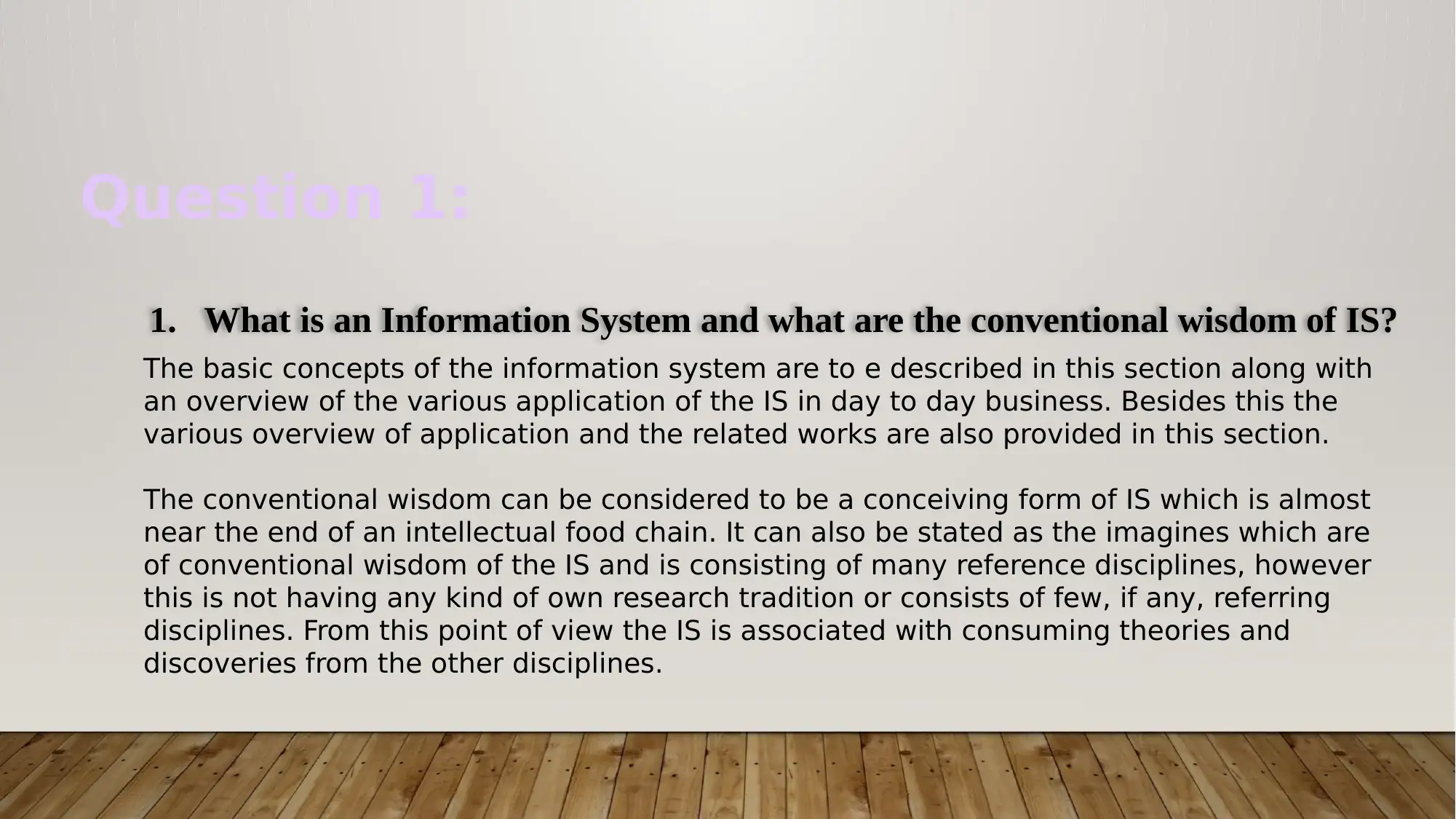
Question 1:
1. What is an Information System and what are the conventional wisdom of IS?
The basic concepts of the information system are to e described in this section along with
an overview of the various application of the IS in day to day business. Besides this the
various overview of application and the related works are also provided in this section.
The conventional wisdom can be considered to be a conceiving form of IS which is almost
near the end of an intellectual food chain. It can also be stated as the imagines which are
of conventional wisdom of the IS and is consisting of many reference disciplines, however
this is not having any kind of own research tradition or consists of few, if any, referring
disciplines. From this point of view the IS is associated with consuming theories and
discoveries from the other disciplines.
1. What is an Information System and what are the conventional wisdom of IS?
The basic concepts of the information system are to e described in this section along with
an overview of the various application of the IS in day to day business. Besides this the
various overview of application and the related works are also provided in this section.
The conventional wisdom can be considered to be a conceiving form of IS which is almost
near the end of an intellectual food chain. It can also be stated as the imagines which are
of conventional wisdom of the IS and is consisting of many reference disciplines, however
this is not having any kind of own research tradition or consists of few, if any, referring
disciplines. From this point of view the IS is associated with consuming theories and
discoveries from the other disciplines.
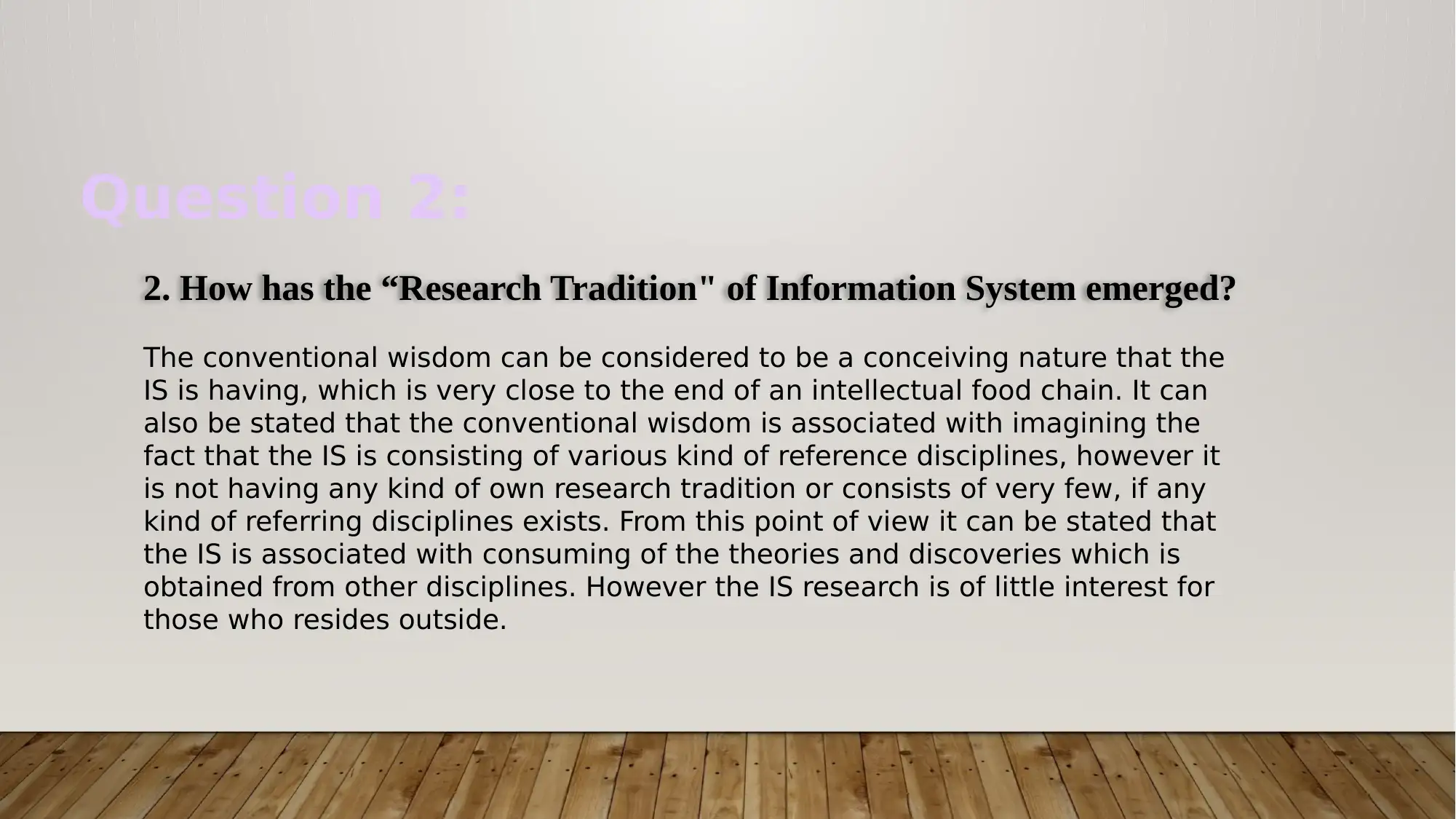
Question 2:
2. How has the “Research Tradition" of Information System emerged?
The conventional wisdom can be considered to be a conceiving nature that the
IS is having, which is very close to the end of an intellectual food chain. It can
also be stated that the conventional wisdom is associated with imagining the
fact that the IS is consisting of various kind of reference disciplines, however it
is not having any kind of own research tradition or consists of very few, if any
kind of referring disciplines exists. From this point of view it can be stated that
the IS is associated with consuming of the theories and discoveries which is
obtained from other disciplines. However the IS research is of little interest for
those who resides outside.
2. How has the “Research Tradition" of Information System emerged?
The conventional wisdom can be considered to be a conceiving nature that the
IS is having, which is very close to the end of an intellectual food chain. It can
also be stated that the conventional wisdom is associated with imagining the
fact that the IS is consisting of various kind of reference disciplines, however it
is not having any kind of own research tradition or consists of very few, if any
kind of referring disciplines exists. From this point of view it can be stated that
the IS is associated with consuming of the theories and discoveries which is
obtained from other disciplines. However the IS research is of little interest for
those who resides outside.
⊘ This is a preview!⊘
Do you want full access?
Subscribe today to unlock all pages.

Trusted by 1+ million students worldwide
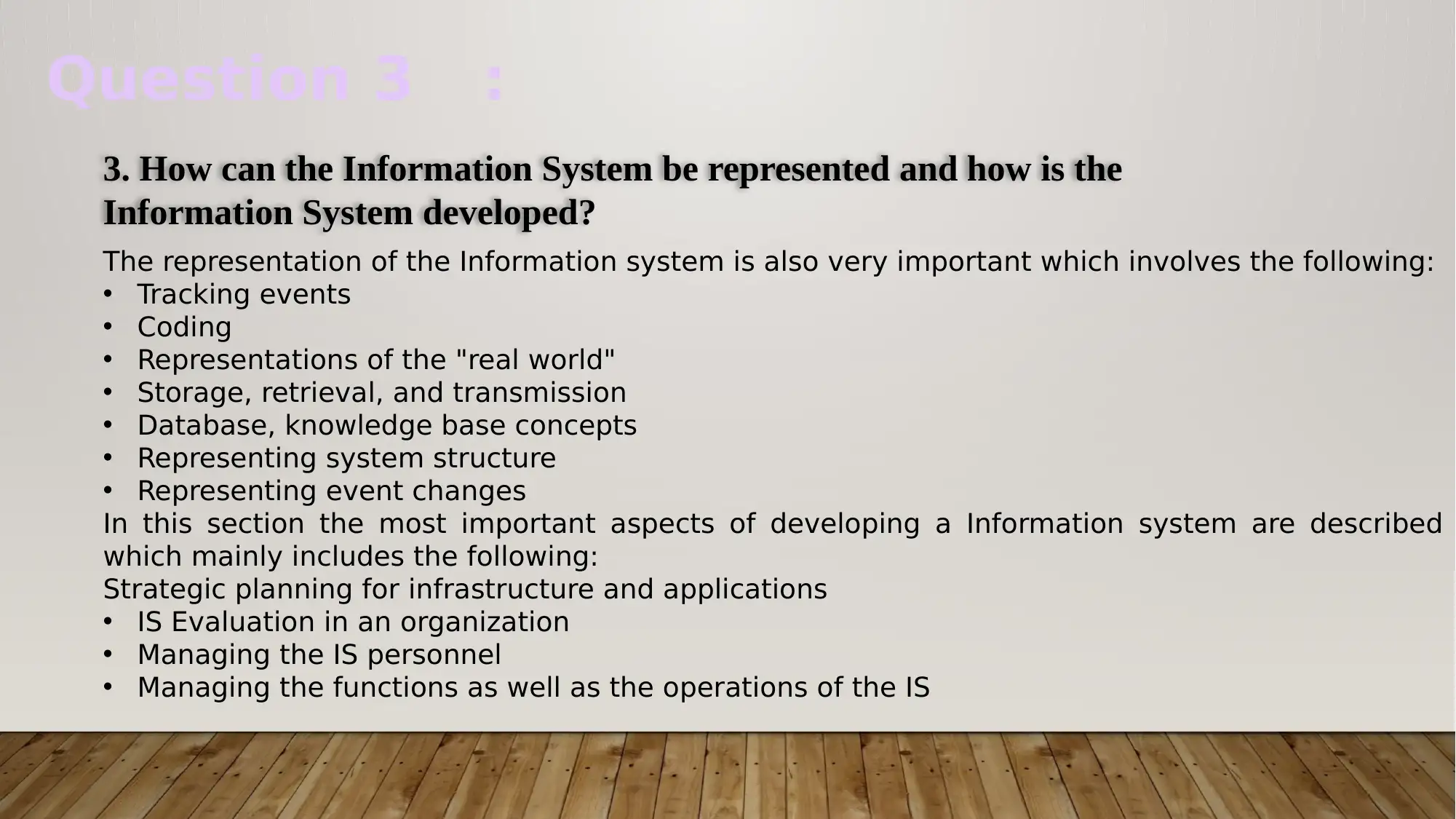
Question 3 :
3. How can the Information System be represented and how is the
Information System developed?
The representation of the Information system is also very important which involves the following:
• Tracking events
• Coding
• Representations of the "real world"
• Storage, retrieval, and transmission
• Database, knowledge base concepts
• Representing system structure
• Representing event changes
In this section the most important aspects of developing a Information system are described
which mainly includes the following:
Strategic planning for infrastructure and applications
• IS Evaluation in an organization
• Managing the IS personnel
• Managing the functions as well as the operations of the IS
3. How can the Information System be represented and how is the
Information System developed?
The representation of the Information system is also very important which involves the following:
• Tracking events
• Coding
• Representations of the "real world"
• Storage, retrieval, and transmission
• Database, knowledge base concepts
• Representing system structure
• Representing event changes
In this section the most important aspects of developing a Information system are described
which mainly includes the following:
Strategic planning for infrastructure and applications
• IS Evaluation in an organization
• Managing the IS personnel
• Managing the functions as well as the operations of the IS
Paraphrase This Document
Need a fresh take? Get an instant paraphrase of this document with our AI Paraphraser
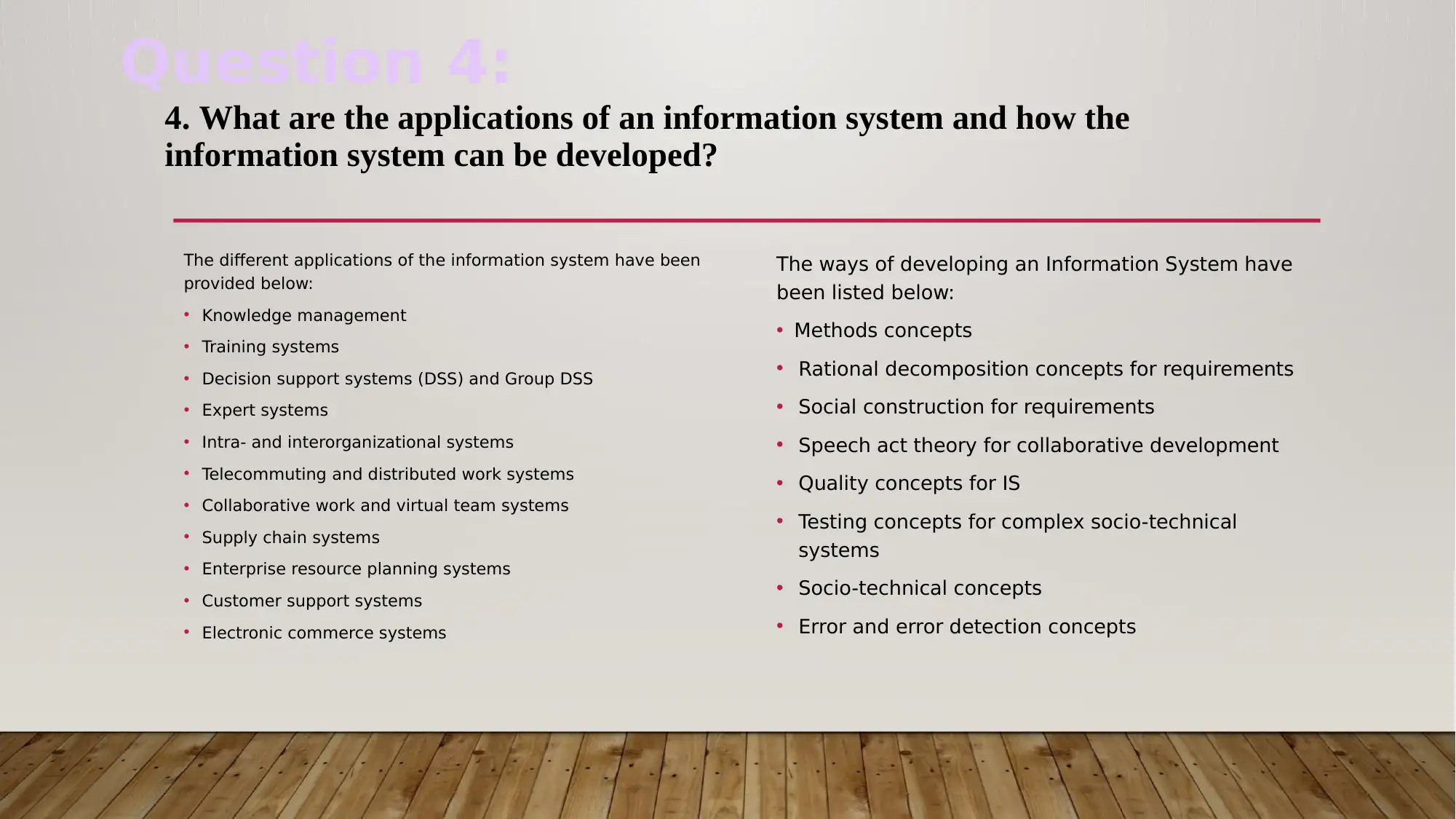
Question 4:
4. What are the applications of an information system and how the
information system can be developed?
The different applications of the information system have been
provided below:
• Knowledge management
• Training systems
• Decision support systems (DSS) and Group DSS
• Expert systems
• Intra- and interorganizational systems
• Telecommuting and distributed work systems
• Collaborative work and virtual team systems
• Supply chain systems
• Enterprise resource planning systems
• Customer support systems
• Electronic commerce systems
The ways of developing an Information System have
been listed below:
• Methods concepts
• Rational decomposition concepts for requirements
• Social construction for requirements
• Speech act theory for collaborative development
• Quality concepts for IS
• Testing concepts for complex socio-technical
systems
• Socio-technical concepts
• Error and error detection concepts
4. What are the applications of an information system and how the
information system can be developed?
The different applications of the information system have been
provided below:
• Knowledge management
• Training systems
• Decision support systems (DSS) and Group DSS
• Expert systems
• Intra- and interorganizational systems
• Telecommuting and distributed work systems
• Collaborative work and virtual team systems
• Supply chain systems
• Enterprise resource planning systems
• Customer support systems
• Electronic commerce systems
The ways of developing an Information System have
been listed below:
• Methods concepts
• Rational decomposition concepts for requirements
• Social construction for requirements
• Speech act theory for collaborative development
• Quality concepts for IS
• Testing concepts for complex socio-technical
systems
• Socio-technical concepts
• Error and error detection concepts
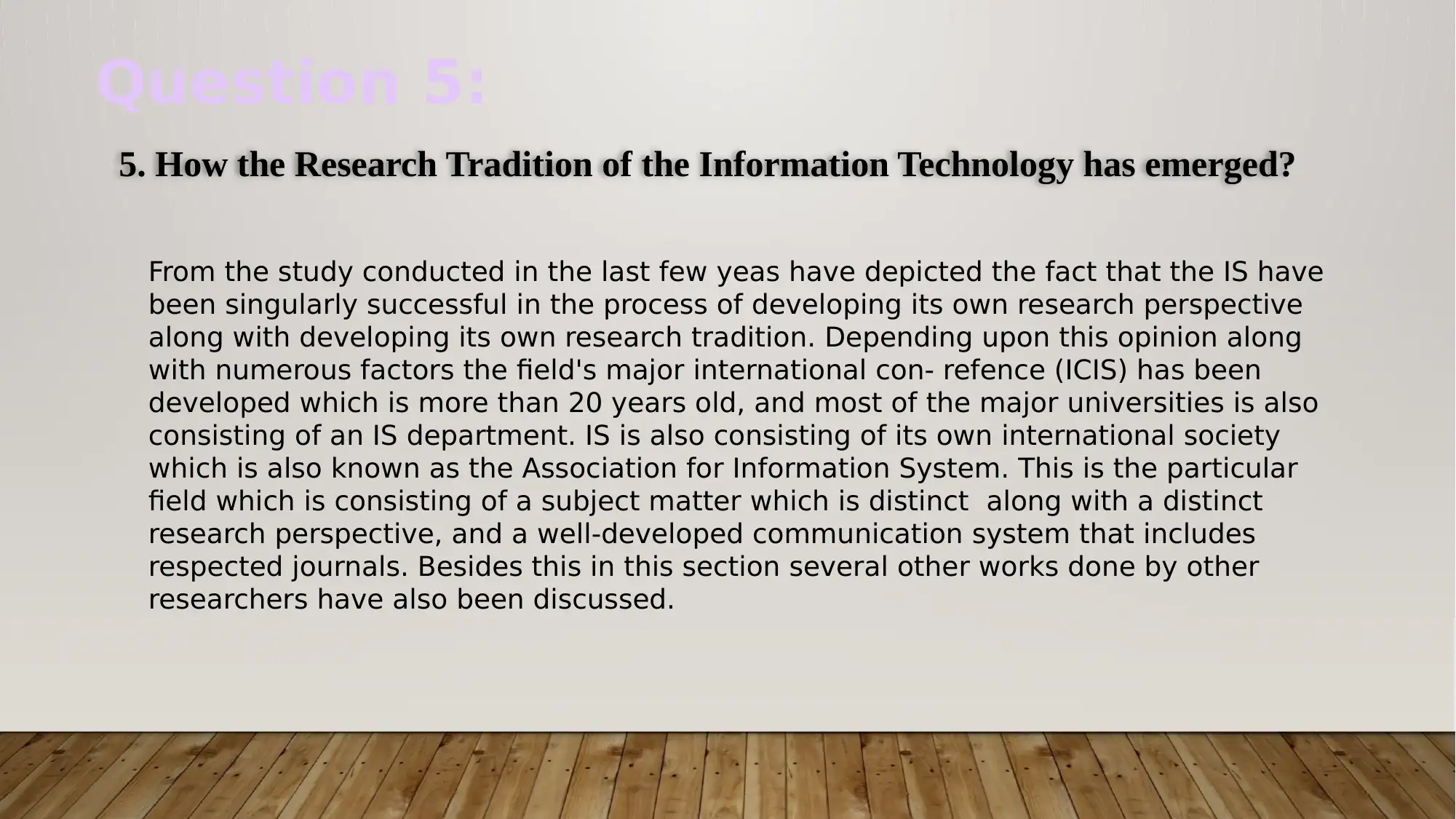
Question 5:
5. How the Research Tradition of the Information Technology has emerged?
From the study conducted in the last few yeas have depicted the fact that the IS have
been singularly successful in the process of developing its own research perspective
along with developing its own research tradition. Depending upon this opinion along
with numerous factors the field's major international con- refence (ICIS) has been
developed which is more than 20 years old, and most of the major universities is also
consisting of an IS department. IS is also consisting of its own international society
which is also known as the Association for Information System. This is the particular
field which is consisting of a subject matter which is distinct along with a distinct
research perspective, and a well-developed communication system that includes
respected journals. Besides this in this section several other works done by other
researchers have also been discussed.
5. How the Research Tradition of the Information Technology has emerged?
From the study conducted in the last few yeas have depicted the fact that the IS have
been singularly successful in the process of developing its own research perspective
along with developing its own research tradition. Depending upon this opinion along
with numerous factors the field's major international con- refence (ICIS) has been
developed which is more than 20 years old, and most of the major universities is also
consisting of an IS department. IS is also consisting of its own international society
which is also known as the Association for Information System. This is the particular
field which is consisting of a subject matter which is distinct along with a distinct
research perspective, and a well-developed communication system that includes
respected journals. Besides this in this section several other works done by other
researchers have also been discussed.
⊘ This is a preview!⊘
Do you want full access?
Subscribe today to unlock all pages.

Trusted by 1+ million students worldwide
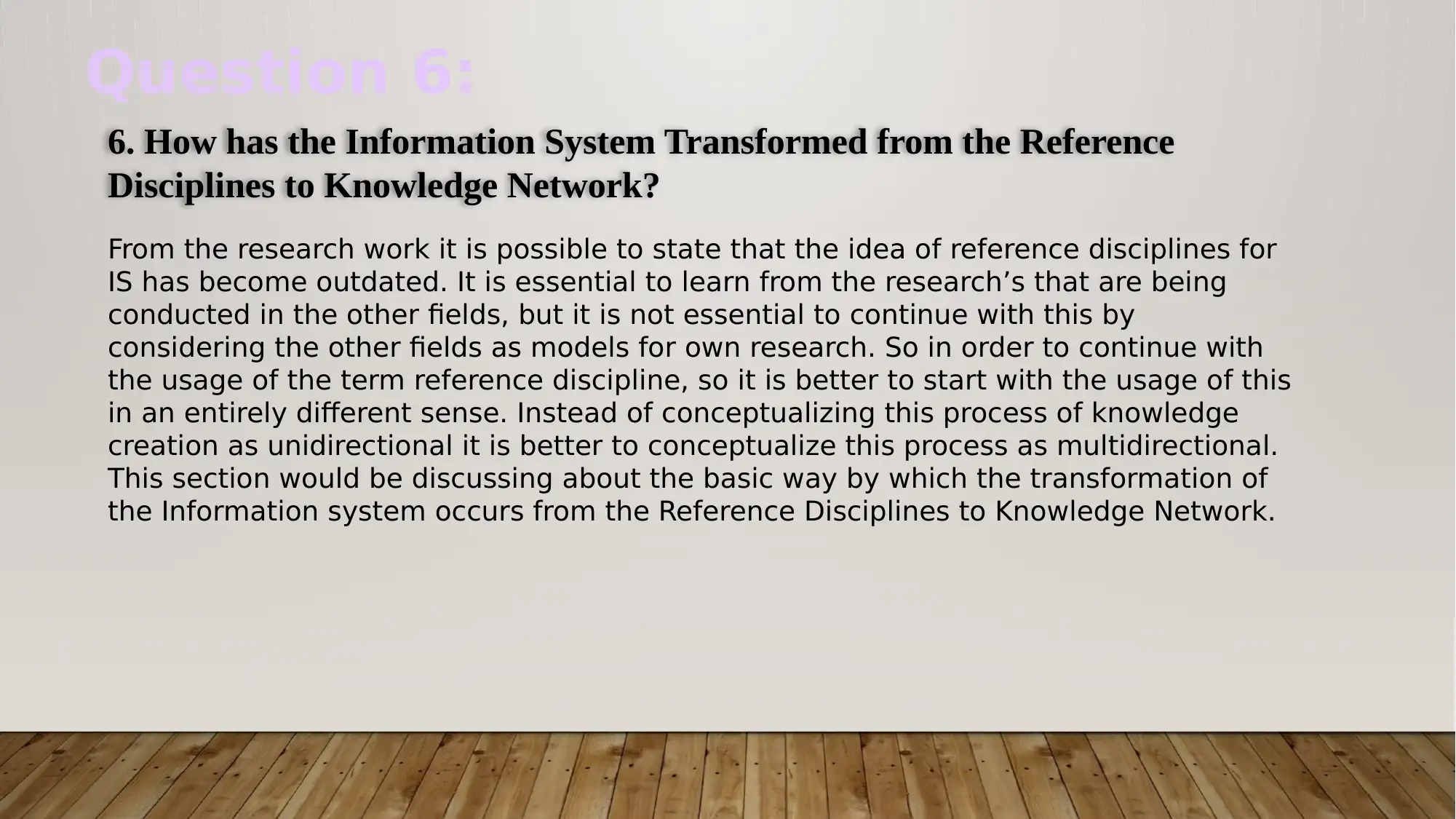
Question 6:
6. How has the Information System Transformed from the Reference
Disciplines to Knowledge Network?
From the research work it is possible to state that the idea of reference disciplines for
IS has become outdated. It is essential to learn from the research’s that are being
conducted in the other fields, but it is not essential to continue with this by
considering the other fields as models for own research. So in order to continue with
the usage of the term reference discipline, so it is better to start with the usage of this
in an entirely different sense. Instead of conceptualizing this process of knowledge
creation as unidirectional it is better to conceptualize this process as multidirectional.
This section would be discussing about the basic way by which the transformation of
the Information system occurs from the Reference Disciplines to Knowledge Network.
6. How has the Information System Transformed from the Reference
Disciplines to Knowledge Network?
From the research work it is possible to state that the idea of reference disciplines for
IS has become outdated. It is essential to learn from the research’s that are being
conducted in the other fields, but it is not essential to continue with this by
considering the other fields as models for own research. So in order to continue with
the usage of the term reference discipline, so it is better to start with the usage of this
in an entirely different sense. Instead of conceptualizing this process of knowledge
creation as unidirectional it is better to conceptualize this process as multidirectional.
This section would be discussing about the basic way by which the transformation of
the Information system occurs from the Reference Disciplines to Knowledge Network.
Paraphrase This Document
Need a fresh take? Get an instant paraphrase of this document with our AI Paraphraser
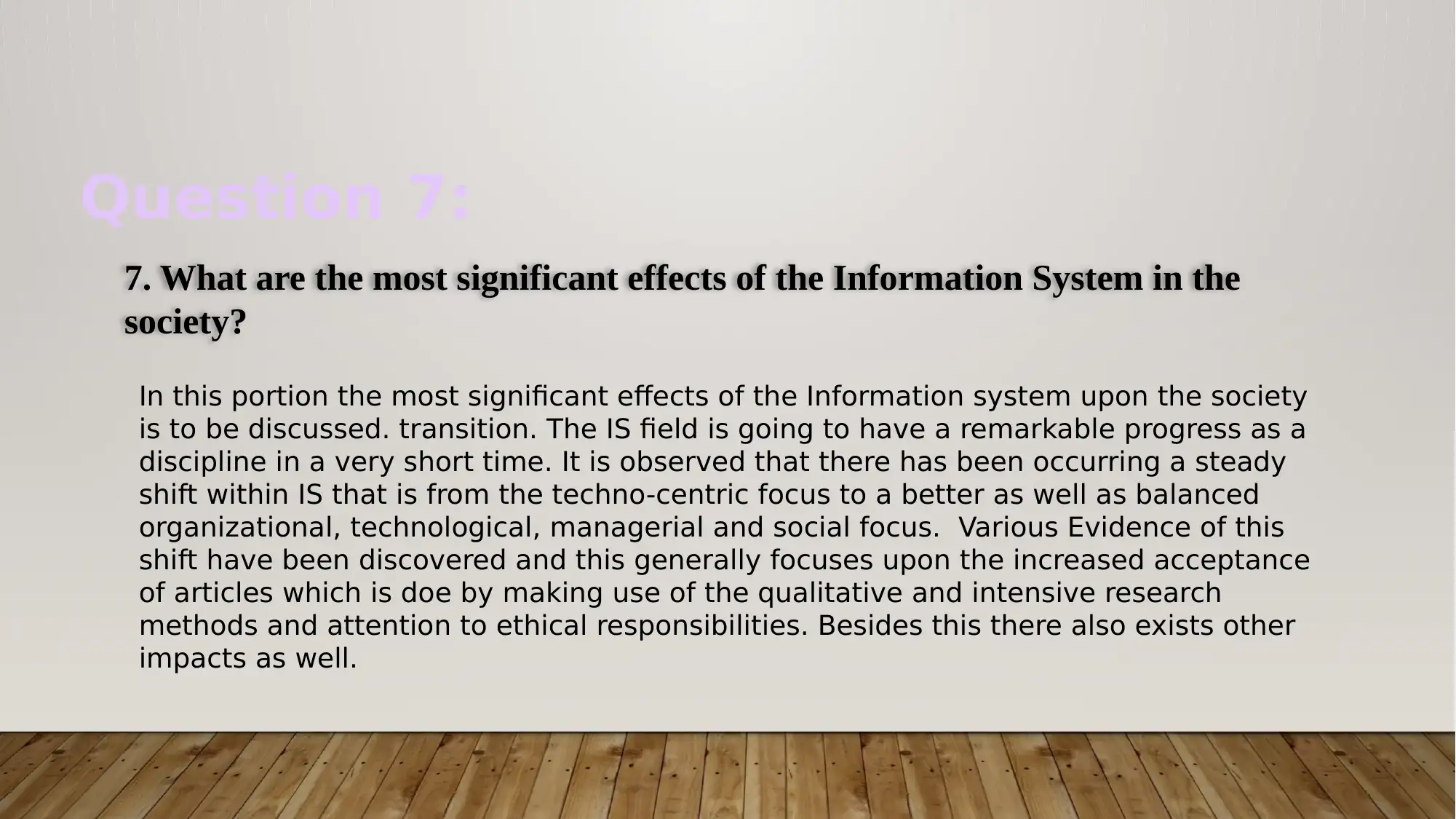
Question 7:
7. What are the most significant effects of the Information System in the
society?
In this portion the most significant effects of the Information system upon the society
is to be discussed. transition. The IS field is going to have a remarkable progress as a
discipline in a very short time. It is observed that there has been occurring a steady
shift within IS that is from the techno-centric focus to a better as well as balanced
organizational, technological, managerial and social focus. Various Evidence of this
shift have been discovered and this generally focuses upon the increased acceptance
of articles which is doe by making use of the qualitative and intensive research
methods and attention to ethical responsibilities. Besides this there also exists other
impacts as well.
7. What are the most significant effects of the Information System in the
society?
In this portion the most significant effects of the Information system upon the society
is to be discussed. transition. The IS field is going to have a remarkable progress as a
discipline in a very short time. It is observed that there has been occurring a steady
shift within IS that is from the techno-centric focus to a better as well as balanced
organizational, technological, managerial and social focus. Various Evidence of this
shift have been discovered and this generally focuses upon the increased acceptance
of articles which is doe by making use of the qualitative and intensive research
methods and attention to ethical responsibilities. Besides this there also exists other
impacts as well.
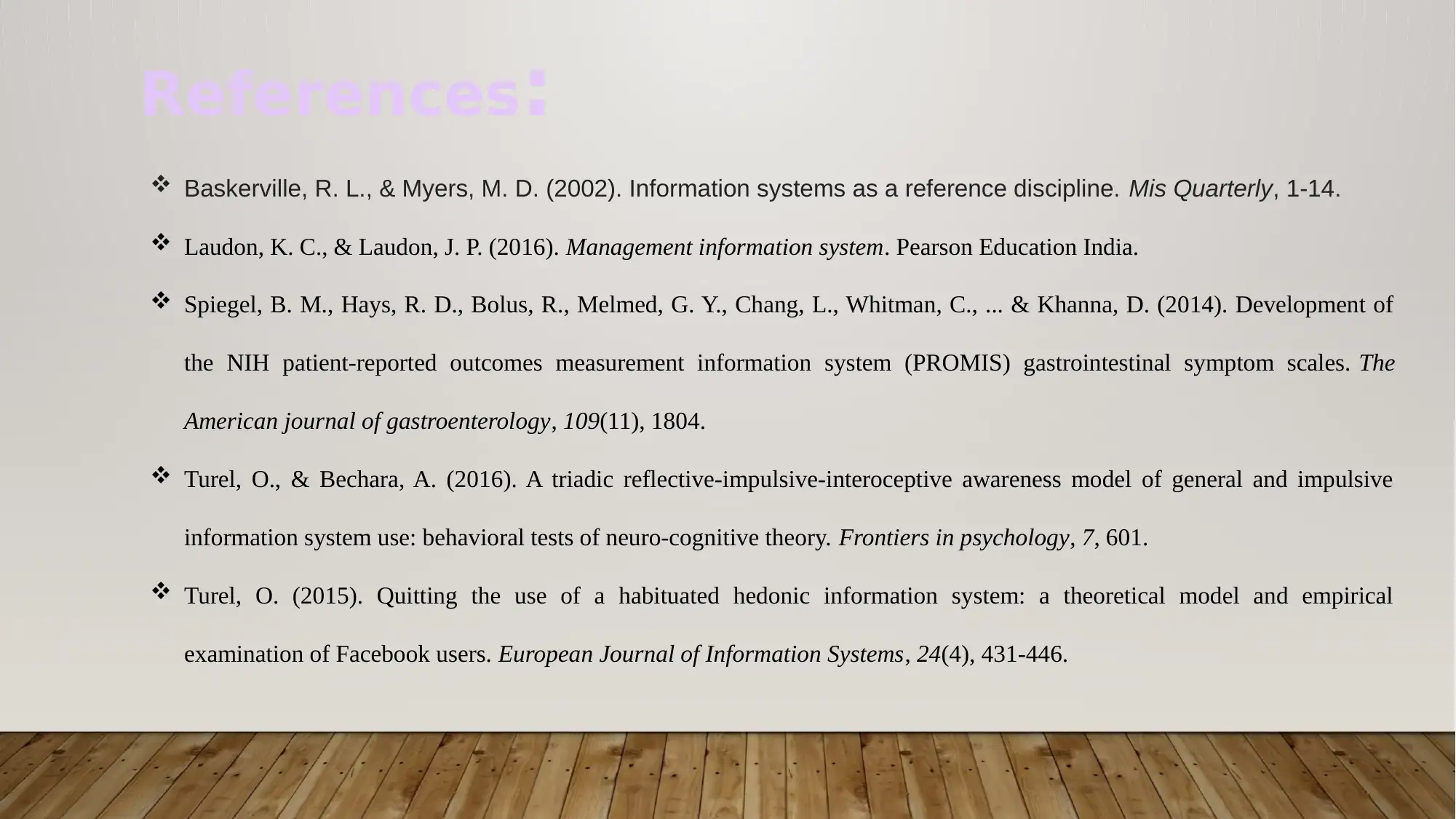
References:
Baskerville, R. L., & Myers, M. D. (2002). Information systems as a reference discipline. Mis Quarterly, 1-14.
Laudon, K. C., & Laudon, J. P. (2016). Management information system. Pearson Education India.
Spiegel, B. M., Hays, R. D., Bolus, R., Melmed, G. Y., Chang, L., Whitman, C., ... & Khanna, D. (2014). Development of
the NIH patient-reported outcomes measurement information system (PROMIS) gastrointestinal symptom scales. The
American journal of gastroenterology, 109(11), 1804.
Turel, O., & Bechara, A. (2016). A triadic reflective-impulsive-interoceptive awareness model of general and impulsive
information system use: behavioral tests of neuro-cognitive theory. Frontiers in psychology, 7, 601.
Turel, O. (2015). Quitting the use of a habituated hedonic information system: a theoretical model and empirical
examination of Facebook users. European Journal of Information Systems, 24(4), 431-446.
Baskerville, R. L., & Myers, M. D. (2002). Information systems as a reference discipline. Mis Quarterly, 1-14.
Laudon, K. C., & Laudon, J. P. (2016). Management information system. Pearson Education India.
Spiegel, B. M., Hays, R. D., Bolus, R., Melmed, G. Y., Chang, L., Whitman, C., ... & Khanna, D. (2014). Development of
the NIH patient-reported outcomes measurement information system (PROMIS) gastrointestinal symptom scales. The
American journal of gastroenterology, 109(11), 1804.
Turel, O., & Bechara, A. (2016). A triadic reflective-impulsive-interoceptive awareness model of general and impulsive
information system use: behavioral tests of neuro-cognitive theory. Frontiers in psychology, 7, 601.
Turel, O. (2015). Quitting the use of a habituated hedonic information system: a theoretical model and empirical
examination of Facebook users. European Journal of Information Systems, 24(4), 431-446.
⊘ This is a preview!⊘
Do you want full access?
Subscribe today to unlock all pages.

Trusted by 1+ million students worldwide
1 out of 9
Related Documents
Your All-in-One AI-Powered Toolkit for Academic Success.
+13062052269
info@desklib.com
Available 24*7 on WhatsApp / Email
![[object Object]](/_next/static/media/star-bottom.7253800d.svg)
Unlock your academic potential
© 2024 | Zucol Services PVT LTD | All rights reserved.



